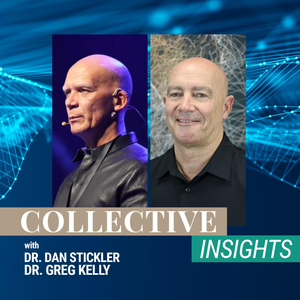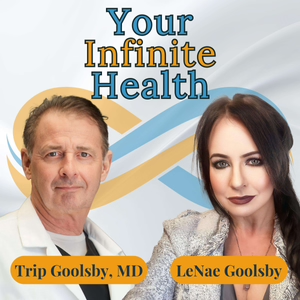
Daniel Belsky: Measuring the Pace of Aging
05/29/24 • 38 min
Our chronological age doesn’t tell us much about how well our bodies are aging, but scientists have developed many ways to measure changes at the cellular and molecular levels, including the rate of change, that can suggest ways to improve health at every stage of life. Follow along as Gordon speaks with Daniel Belsky of Columbia University about DNA methylation, the effects of famine and poverty on aging biology, studying the exposome, and how to create equitable access to potential aging interventions.
Dr. Belsky is an Associate Professor of Epidemiology in the Robert N. Butler Columbia Aging Center at Columbia University. His studies seek to understand how genes and environments combine to shape health across the life course. The goal of Dan's work is to reduce social inequalities in aging outcomes in the US and elsewhere. With collaborators Terrie Moffitt and Avshalom Caspi he originated the Pace of Aging method to quantify the aging process from longitudinal analysis of human physiology and recently translated this method into a DNA-methylation blood test that can be implemented from a single time point of data collection. He is principal investigator of NIH-funded projects to test how caloric restriction may slow or reverse aging-related changes to the genome (CALERIE), to understand long-term impacts of in-utero famine exposure on biological aging (Dutch Hunger Winter Family Study, with Bertie Lumey), and to test the potential of anti-poverty policy intervention to slow biological aging (MyGoals for Healthy Aging, with Peter Muennig). Dan's work has received international attention, including by the Wall Street Journal, Washington Post, and Guardian newspapers, and appeared in outlets including PNAS, Nature Human Behaviour, Nature Aging, the JAMA journals, Lancet Respiratory Medicine, and top journals in epidemiology and gerontology. Since 2020, he has been named an ISI highly-cited researcher.
Our chronological age doesn’t tell us much about how well our bodies are aging, but scientists have developed many ways to measure changes at the cellular and molecular levels, including the rate of change, that can suggest ways to improve health at every stage of life. Follow along as Gordon speaks with Daniel Belsky of Columbia University about DNA methylation, the effects of famine and poverty on aging biology, studying the exposome, and how to create equitable access to potential aging interventions.
Dr. Belsky is an Associate Professor of Epidemiology in the Robert N. Butler Columbia Aging Center at Columbia University. His studies seek to understand how genes and environments combine to shape health across the life course. The goal of Dan's work is to reduce social inequalities in aging outcomes in the US and elsewhere. With collaborators Terrie Moffitt and Avshalom Caspi he originated the Pace of Aging method to quantify the aging process from longitudinal analysis of human physiology and recently translated this method into a DNA-methylation blood test that can be implemented from a single time point of data collection. He is principal investigator of NIH-funded projects to test how caloric restriction may slow or reverse aging-related changes to the genome (CALERIE), to understand long-term impacts of in-utero famine exposure on biological aging (Dutch Hunger Winter Family Study, with Bertie Lumey), and to test the potential of anti-poverty policy intervention to slow biological aging (MyGoals for Healthy Aging, with Peter Muennig). Dan's work has received international attention, including by the Wall Street Journal, Washington Post, and Guardian newspapers, and appeared in outlets including PNAS, Nature Human Behaviour, Nature Aging, the JAMA journals, Lancet Respiratory Medicine, and top journals in epidemiology and gerontology. Since 2020, he has been named an ISI highly-cited researcher.
Previous Episode

Kristen Fortney: Finding Targets for Aging Interventions
Of all the biochemical changes that occur with aging, what really matters? How can we use the incredible amount of health data available today to discover the best targets for interventions? In this episode, Kristen Fortney of BioAge talks with Gordon about the latest research in proteomics and metabolomics, the importance of muscle loss, and the challenge of measuring the right endpoints for effective treatment and regulatory approval.
Kristen Fortney is the co-founder and CEO of BioAge, a clinical-stage biotechnology company developing a pipeline of treatments to extend healthy lifespan by targeting the molecular causes of aging. The company uses its discovery platform, which combines quantitative analysis of proprietary longitudinal human samples with detailed health records tracking individuals over the lifespan, to map out the key molecular pathways that impact healthy human longevity. By targeting these pathways with a large and mechanistically diverse portfolio of drugs, BioAge is unlocking opportunities to treat and prevent diseases of aging in entirely new ways. Kristen’s scientific background is in aging biology and bioinformatics. She received her PhD in Medical Biophysics from the University of Toronto, followed by postdoctoral training at Stanford University, where she was a fellow of the Ellison Medical Foundation & American Federation for Aging Research.
Next Episode

Andrea Maier: From Potential to Practice
The movement to integrate longevity treatments into clinical care is making strides. How can we ensure they are evidence-based, accessible, and personalized? World-renowned geroscientist Andrea Maier has been leading the way with innovative clinical trials and cutting edge research. In this episode, she talks with Gordon about the current state of the field, why we need a variety of clocks and interventions, what we can all do now to age better, and what the future of clinical practice looks like.
Professor Andrea Maier is a prolific researcher in the field of geroscience — the intersection of aging biology, chronic disease, and health. A principal investigator in gerontology, as well as a specialist in internal medicine and geriatrics, Professor Maier's aging research focuses on age-related diseases, cellular senescence and the translation of results into clinical practice. She has published almost 400 peer-reviewed articles and has spearheaded significant contributions of her highly acclaimed innovative, global, multidisciplinary work with her @Age Research Group. Professor Maier holds professorship appointments at VU University Medical Centre, Amsterdam, Netherlands and University of Melbourne, Australia. Professor Maier is the past President of the Australia and New Zealand Society for Sarcopenia and Frailty Research and founding president of the Healthy Longevity Medicine Society. She sits on several prestigious international academic and health policy committees and organizations, including national and international research funding agencies and the World Health Organization.
If you like this episode you’ll love
Episode Comments
Generate a badge
Get a badge for your website that links back to this episode
<a href="https://goodpods.com/podcasts/were-not-getting-any-younger-yet-311283/daniel-belsky-measuring-the-pace-of-aging-52909558"> <img src="https://storage.googleapis.com/goodpods-images-bucket/badges/generic-badge-1.svg" alt="listen to daniel belsky: measuring the pace of aging on goodpods" style="width: 225px" /> </a>
Copy




